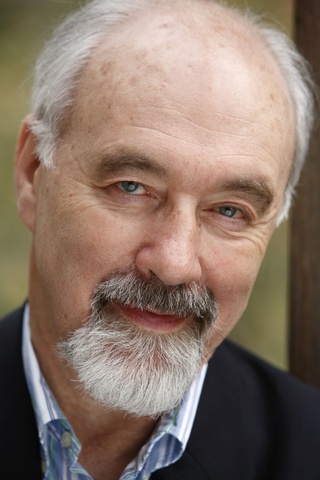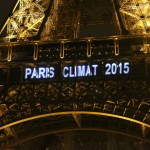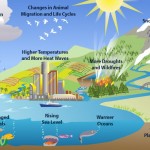Francis Pisani on climate change and environmental engagement
How to make cities smarter and more sustainable?
This week we talked to Francis Pisani – journalist, writer, lecturer. Recently he dealt with how to make cities smarter and more sustainable. And today he’s here to share his thoughts on climate change, environmental engagement and COP21 in Paris.
Tell us of your involvement with the environment and the fight against climate change in your professional and personal lives
My involvement is not the best because I travel a lot by plane and for that I should be shot. But I compensate for this by not having a car and by using public transportation. People who use their cars every day are much more dangerous in terms of pollution than people who take planes. However, I think climate change is one of the five major upheavals of our time, and this makes my case even more serious because I believe that it is too easy to ask large corporations or governments to deal with the issue of climate change, it is our fight. I pay attention, not to planes, I pay attention to cares, and I am one of a rapidly growing number of people who are becoming more and more careful as their interest in the subject has grown.
In your opinion, how can French citizens mobilize to act against climate change?
No idea. What I do know is that you can always do more – it’s a problem of education, it’s a problem of awareness, it’s a learning problems, and it’s a problem that is played on many levels because every day, at all times, we face simple questions like “should I leave the light on?”. A large part of this is basic education, but it also collective actions, such as waste management, and it’s things where we must demand more from businesses, government, municipalities, and regions. What I find important is that this is a debate that is played on all levels and upon which action must be taken at all levels, which is very hard, even when you demonstrate goodwill. And, in fact, we never do enough, but what counts is to always do more.
Which of these do you think could have the biggest impact in the fight against climate change: political discussions or bottom-up campaigns (such as the Climate Marchs in September)?
In much the same way that we are involved at all levels, and we must address the issue at all levels, we must promote awareness, discussion, reflection, and information at all levels. It is through family discussions and through organized action like the Climate March, even if the immediate results are limited, that change takes place. What we discovered with social networks, and one of its biggest advantages, is that we realized we are not alone in our opinions – there will always be more people than we perceive who have the same convictions that motivate us. This is what we saw at the time of the Arab Spring, it’s what we saw with plenty of other demonstrations, and it’s this sudden clarity and visibility that have mobilized people around the world. For example, the most important march in New York in decades took place last week and seeing this reinforces the resolve and willingness of people to take action. The flow of information through social networks, discussions, and position papers is a constant way of keeping up to date with the biggest debates going on in the world. We must inform ourselves, ask ourselves what is going on, and seek to educate those around us. One of the things I find amazing today is that there are still people who challenge the veracity of the information available on climate change.
How has the mobilization against climate change evolved in the past few years, as awareness of the problem has grown?
The number of people who are knowledgeable on the subject is larger, the number of people who are prepared to do something is bigger, and the tools at our disposal to circulate all this are more sophisticated. I remember one of the first interesting things to happen on the Web was against World Trade Organization Summit in Seattle, around 1997, and there were very few people who were hardcore militants. Today, this is no longer the case. Now everyone can be mobilized and everyone can join the debate from home. Consciousness on the matter is gaining ground and we don’t need to be hardcore, throw-yourself-at-police activists, and I find that extremely important. I think one of the basic things is that you cannot just look at Seattle, D.C., New York, London, or Paris, awareness is increasing, the problems aren’t easy, but awareness is increasing. Even the China, a country that pollutes a lot, are starting to realize they need to do something. And there are a lot of people around the globe who are trying to do something. Today there is no solution, what matters is making everyone talk at all levels, in as many ways as possible. And it won’t be enough.
It won’t be enough?
No. What I mean is it won’t be enough today. Let’s hope that it will be enough one day.
Yes, let’s hope…
No, it is not enough to hope, we have to take action. It’s not the same thing.
What do you think are the main issues at stake for the COP21?
No idea. You know, this kind of conference does not seem to ever play a decisive role in debates. I am not against anything because I am for everything, but the importance of a conference like this is to convince the most timid people to join the conversation and take action. This debate will play a part, but it will not play the biggest part. There are other determinants.
What are the other determinants?
For me, the most important thing is the role of cities in the fight against climate change. We tend, historically, especially in the last fifty years, to see in cities the biggest factors for contamination and global warming. But that’s changing – today, a lot of people are realizing that cities are the playing field for fighting climate change. First, there is an undeniable trend towards urbanization – do not forget that in the thirty five years to come, the population of cities will double, which is one of the major reasons why we must settle this problem. The advantage of cities is that they are places of proximity that foster different kinds of relations – mayors are in contact with the people while Presidents and Prime Ministers are far from everything, and cities incubate the birth of movements.
I like to talk about climate challenge rather than climate change – that is to say – how do we address this question? The first level is, as I said before, in the city, where you find large companies, municipalities, institutes, associations, and individuals who mobilize and participate. In addition, there many cities in the world are threatened by climate change and therefore they have a vested interest creating change. The other fundamental concepts are protection against climate change and resilience. These two are key towards a successfully involved city – on the one hand you put the protection of walls so that water does not invade your city, and on the other, you build on your resilience. This is acknowledging that, with the rise of the importance of natural disasters, you cannot be sure that you’ll be able to make it through, and there will always be a greater disaster than those that came before, so the question is how do you face the devastation and destruction and come out alive on the other end? Resiliency is a concept that the French do not know and that I find absolutely essential. And the interesting thing is that this brings us full circle back to what I was talking about in the beginning – for the resilience to work we need a work area with people, municipalities, private enterprises, individuals, associations, people from different sectors working on all levels. So I think the fight takes place at the city level because today people are not only much more knowledgeable, but they’re looking for a cause and they want to help.
The aim of the COP21 is to achieve, for the first time in over 20 years of UN negotiations, a binding and universal agreement on climate change. In your opinion, do you think this is a possibility?
I have no idea. It is not a key determining factor for me because people, and governments especially, have never respected the very treaties they sign.
So, in your opinion, an informed population is a population that will take action and create change?
On the most basic level, a population must be informed, but it must also be aware and, most importantly, willing to act. You can be informed and not realize it, not become aware. Awareness is to say “ah, there’s a problem, I must do something”, but now you have the information and you have the conscious knowledge, but you do nothing. And on the third and final level, people begin to do something. I think there are more and more people who are at this stage, but it is still not enough and the world powers are still turning a blind eye to a very real problem.
Check our Mr. Pisani’s work on climate change!



